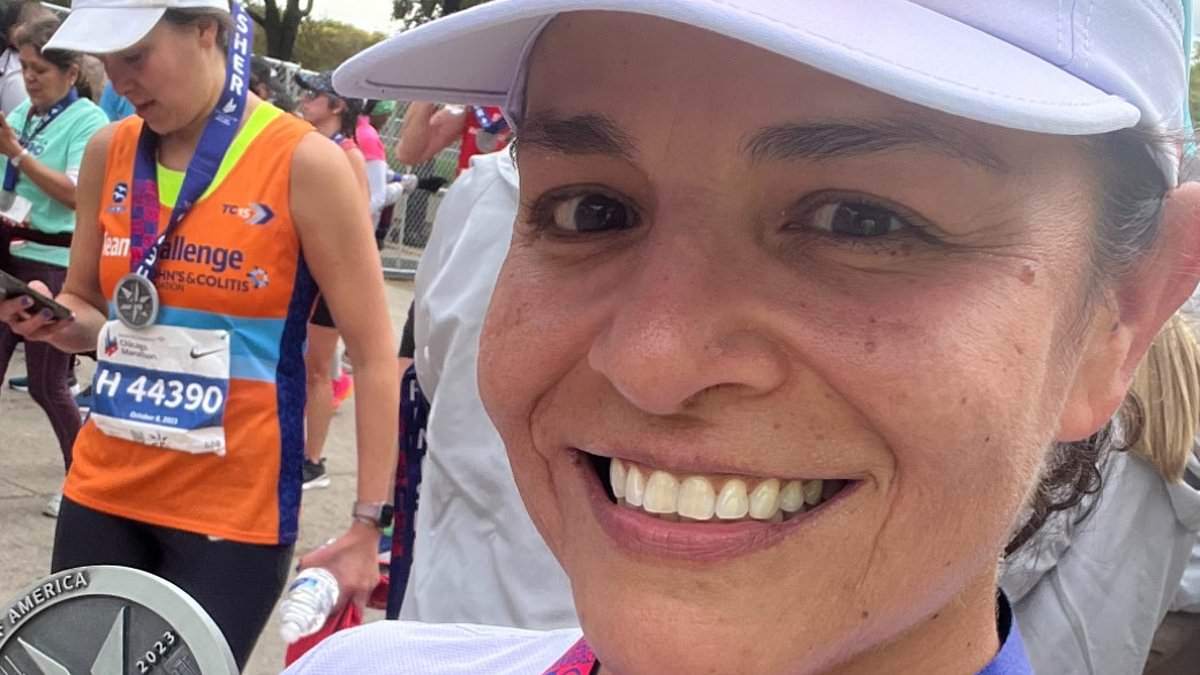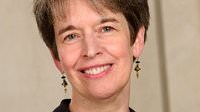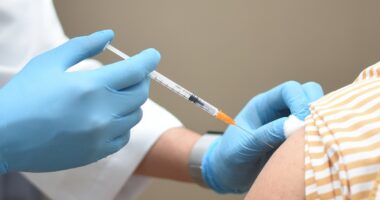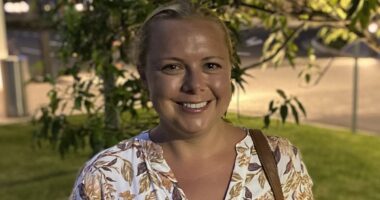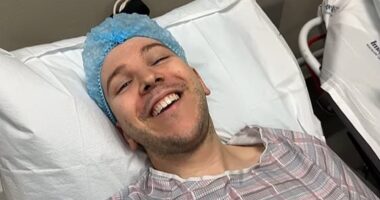
Liliana Martin is pictured at the finish line of the Paris marathon in 2023 after completing chemo
Liliana Martin was the picture of health.
She ate a clean, vegan diet, didn’t drink alcohol and ran marathons all over the world.
And while it was her lifelong mission to stave off cancer, given an extensive family history of the disease, it came for her anyway.
She was diagnosed with stage 2 bladder cancer at 43 in 2022, just as the Chicago attorney had just started a new job.
She didn’t know her coworkers well, and because they worked remotely, she had very little facetime with her boss.
So she decide to keep her diagnosis under wraps out of fear her colleagues would treat her differently, pity her, and keep her off difficult projects. Cancer or not, she wanted to be treated like everyone else.
Nearly a dozen cancer patients told DailyMail.com about how they hid their diagnoses from spouses, parents, coworkers, or friends for different reasons, including a fear of being treated differently, being pitied, or losing their coworkers’ confidence.
Business consultant Anastasia Bulucevska, 35, is still hiding her breast cancer from her mother to this day ‘because I don’t want my mom to worry.’
Doctors told DailyMail.com cancer patients are increasingly skewing younger, which means they are receiving a diagnosis while at the peaks of their professional lives and as they seek to start families.
It then becomes more convenient to keep their cancers under wraps until their prognosis becomes clearer, according to Dr Mary Poffenroth, a therapist in California.

Liliana was able to keep her chemo a secret because she worked from home. She scheduled her Friday workday around her treatment in the morning for six weeks. Photo courtesy of Liliana Martin
Kristie Tse, a licensed therapist in New York City, said: ‘When someone is diagnosed with cancer, they may choose to keep it a secret due to the stigma and assumptions often associated with the disease.
‘They might worry about being treated differently or being marginalized in professional or social circles.
‘For some, maintaining privacy allows them to cope with their diagnosis without the additional burden of managing others’ emotions and expectations.’
Liliana had been noticing blood in her urine for months, which she attributed to the impact running has on her bladder, a condition called exercise-induced hematuria.
She also believes her symptoms were undermined because bladder cancer is three times as common in men than women.
Globally, the incidence of bladder cancer is 9.5 per 100,000 men per year, compared to 2.4 per 100,000 women per year
Liliana didn’t tell her employer or coworkers about her diagnosis until she completed chemotherapy in March 2023.
She told DailyMail.com: ‘I just didn’t know the people that I was working with, because even at six months it was all remote. I would talk to my boss every once in a while over the phone and that was it.
‘So I didn’t have a good feel for the people. I didn’t know them well, and I didn’t want them to to think that I wasn’t going to be able to do difficult projects.
‘I wanted them to give me a fair shot at succeeding in my new position. I did not want to be treated differently and wanted to be able to compete on a level playing field.’
Liliana also didn’t tell anyone outside of her immediate family.
She said: ‘I actually made my circle even smaller once I was told that I needed to have chemo because I just I couldn’t handle it… f I didn’t tell them, they wouldn’t have to worry so much.’

Liliana is now in remission, but given the high rate of recurrence when it comes to bladder cancer, she sees an oncologist biannually. Photo courtesy of Liliana Martin

Liliana kept training for her marathon, running around four miles per day, while undergoing chemotherapy. Photo courtesy of Liliana Martin
Cancer patients often don’t want to burden family and friends, who typically react with alarm that can be overwhelming to a person already grappling with the diagnosis themselves.
Many of Liliana’s cousins had dealt with some form of cancer, and she feared the news could be ‘triggering’ to her aunts and uncles.
She said: ‘We lost my cousin. He was 14 years old and died of Hodgkin’s lymphoma. So I specifically told my mom, please don’t tell my aunt, because I don’t want her to relive the loss of her son.
‘We kind of kept it under wraps until we knew that I was going to be okay.’
Meanwhile, in London, Anastasia Bulucevska, a 35-year-old former real-estate agent turned business consultant, had discovered she had two tumors in each breast. It turned her world upside down, though she largely kept it to herself.
She told DailyMail.com: ‘I didn’t knew what to do and I was in a not so good place, thinking of the worst.
‘I only told two if my friends and the executive chef, as I was working as a personal assistant to chefs at the Savoy Hotel.’
She kept it from her parents though, and only told her dad years later when her treatment ended. Her mom still doesn’t know.
Her family lives in her native Ukraine.
She added: ‘Because I don’t want my mom to worry.
‘She always does and she shouldn’t be. I found out about my lumps two years after somebody in my family had to go through a breast cancer surgery.’
Unlike Liliana, who worked from home part of the week and could schedule her remote work around Friday chemo treatments, Anastasia had to tell her employer for both support in the event of an emergency and to get time off for treatment.

Anastasia kept her breast cancer diagnosis from her parents, who lived thousands away in Ukraine. She told a couple of coworkers in her home city, London, because she knew she would need to take off work for hospital visits
Still others may keep it a secret to protect their own sanity.
Ryan Parker-Jones, a breast cancer survivor from Plantation, Florida, told DailyMail.com: ‘I’ve kept it a secret from one person because they have a tendency to provide unsolicited advice.
‘I also have some family that think they can heal my cancer if I just keep my body alkaline, take their “do my own research” stuff, and use mindful praying to shrink it away.
‘It’s always fun telling them, “thanks but I’m following my doctor’s advice instead.”‘
And for many, the experience of simply speaking the words can be too overwhelming.
Kelyn Martin of Alabama (no relation to Liliana) told DailyMail.com that she ‘kept it a secret for a while until I really knew more and to also try and process it a lot myself and feel okay with it.
‘Emotions are everywhere during the first stages. When I spoke it I felt like when talking I would pass out from anxiety – literally I felt the room spinning but now it has gotten a lot better.’
Ms Martin added she hates to be the center of attention, ‘and I think that’s why I kept it to myself for so long.’
She finally told her coworkers and employer about her health scare after she completed chemo. She is now in remission.
Someone may also decide to keep their diagnosIs to themselves if the type of cancer they have could have been caused by certain lifestyle habits, such as a long history of smoking leading to lung or mouth cancer.
![Ryan Parker-Jones [right], a breast cancer survivor, chose not to tell certain people in her circle because she knew they would offer advice she didn't ask for, such as using 'mindful praying'. Photo courtesy of Facebook](https://i.dailymail.co.uk/1s/2024/10/01/17/90195559-13900123-Ryan_Parker_Jones_right_a_breast_cancer_survivor_chose_not_to_te-a-6_1727798473735.jpg)
Ryan Parker-Jones [right], a breast cancer survivor, chose not to tell certain people in her circle because she knew they would offer advice she didn’t ask for, such as using ‘mindful praying’. Photo courtesy of Facebook

Kelyn Martin kept her cancer under wraps because she was still trying to wrap her head around the diagnosis herself. Even speaking the words made her dizzy. Photo courtesy of Facebook
Deciding who to tell and when to tell them is just one means of maintaining control over such a scary situation.
But keeping such a life-altering secret takes a toll. A fear of losing control causes anxiety, and the more perceived control one has over their life, the better they feel, according to Dr Mary Poffenroth, a researcher at San Jose State University who specializes in the study of how biological processes like brain function and genetics influence behavior and emotions.
She said: ‘Keeping the diagnosis largely secret until they feel ready is a way for patients to maintain ownership over their narrative. It allows them to disclose details on their own schedule and terms, rather than facing questions or discussions before they feel prepared.
‘This preserves a sense of autonomy during a vulnerable experience where so much feels outside of one’s control.’
Holding onto the weight of such a secret, combined with fear of the disease itself, can lead to greater anxiety, depression, and loneliness.
Psychologist Kerry Haddock said: ‘Minimizing something very significant like a cancer diagnosis might be a coping tool for some. It usually isn’t an effective coping strategy, especially in the long- term.
‘However it may feel more comfortable to avoid facing difficult emotions and further processing the diagnosis when telling others.’
Research has shown the emotional support that comes after disclosing a cancer diagnosis is crucial to coping with the stress and fear that comes alongside the devastating news.
A 2022 study by Australian researchers conducted interviews with 47 people, including patients, caregivers, and health experts, and the consensus was that emotional care is essential for improving quality of life while a person is undergoing cancer treatment.
Addressing emotional needs enables patients to better manage treatment challenges, make informed decisions, and communicate effectively with healthcare teams.
This type of honesty can, at the end of the day, save lives.
Alex Banta, a clinical social worker in Ohio, said: ‘Cancer is such a heavy diagnosis that carries significant complications and weight but despite the heaviness, the person with cancer wants to remain themselves.
‘Once someone receives a diagnosis everyone around them may associate them with their diagnosis and their previous identity can begin to erode.’

